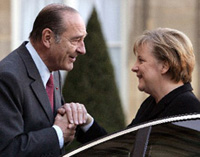
Accompanied by the new German Foreign Minister Frank-Walter Steinmeier, Merkel, the first woman chancellor in German history, visited Paris on Wednesday. She will also visit Brussels and London.
"A strong relationship between Germany and France is both necessary and beneficial to Europe," the conservative new leader of a German left-right coalition government told reporters.
She said she hoped to keep up the "rhythm" of Franco-German meetings and invited Chirac to visit Berlin in early December.
Chirac affirmed that France and Germany wanted "a political and social Europe" and stated that "a truly strong Franco-German axis" was necessary for the continent.
He said the two countries shared a common view and both wanted "a political and social Europe" based on solidarity, common policies and permanent effort of harmonizing common policies.
He thanked Merkel for her visit to Paris, saying he saw it as a sign of friendship.
The president said "a truly strong Franco-German axis" was necessary for the 25-member European Union, while insisting that France and Germany had no intention to impose their points of view on other European countries.
In Brussels, home to the European Commission, Merkel will meet NATO Secretary General Jaap de Hoop Scheffer, in a move her advisers say is intended to underline the importance of Germany's transatlantic partnership with the United States.
She will also meet European Commission President Jose Manuel Barroso and the head of the European parliament, Josep Borrell.
She is due to dine in London today with British Prime Minister Tony Blair, who will welcome her as a reform-minded ally within the European Union after his frequent clashes with Schroeder over the years.
Merkel took power Tuesday as Germany's first female chancellor, ending months of political uncertainty.
She is Germany's eighth postwar chancellor and the first one to have grown up in the former communist east.
The 51-year-old former scientist succeeded Gerhard Schroeder, whose government of Social Democrats and Greens was ousted by voters on Sept. 18. But lacking a majority, Merkel's Christian Democratic Union has been forced into a coalition with Schroeder's Social Democrats.
(Xinhua News Agency November 24, 2005)
|

